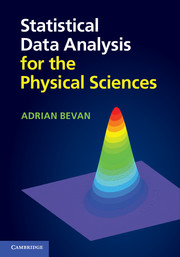Book contents
- Frontmatter
- Contents
- Preface
- 1 Introduction
- 2 Sets
- 3 Probability
- 4 Visualising and quantifying the properties of data
- 5 Useful distributions
- 6 Uncertainty and errors
- 7 Confidence intervals
- 8 Hypothesis testing
- 9 Fitting
- 10 Multivariate analysis
- Appendix A Glossary
- Appendix B Probability density functions
- Appendix C Numerical integration methods
- Appendix D Solutions
- Appendix E Reference tables
- References
- Index
3 - Probability
Published online by Cambridge University Press: 05 July 2013
- Frontmatter
- Contents
- Preface
- 1 Introduction
- 2 Sets
- 3 Probability
- 4 Visualising and quantifying the properties of data
- 5 Useful distributions
- 6 Uncertainty and errors
- 7 Confidence intervals
- 8 Hypothesis testing
- 9 Fitting
- 10 Multivariate analysis
- Appendix A Glossary
- Appendix B Probability density functions
- Appendix C Numerical integration methods
- Appendix D Solutions
- Appendix E Reference tables
- References
- Index
Summary
The probability of something occurring is the quantification of the chance of observing a particular outcome given a single event. The event itself may be the result of a single experiment, or one single data point collected by an un-repeatable experiment. We refer to a single event or an ensemble of events as data, and the way we refer to data implies if data is singular or plural. If we quantify the probability of a repeatable experiment, then this understanding can be used to make predictions of the outcomes of future experiments. We cannot predict the outcome of a given experiment with certainty; however, we can assign a level of confidence to our predictions that incorporates the uncertainty from our previous knowledge and any information of the limitations of the experiment to be performed.
Consider the following. A scientist builds an experiment with two distinct outputs A and B. Having prepared the experiment, the apparatus is configured to always return the result A, and never return the result B. If the experiment is performed over and over again one will always obtain the result A with certainty. The probability of obtaining this result is 1.0 (100%). The result B will never be observed, and so the probability of obtaining that result is 0.0 (0%).
- Type
- Chapter
- Information
- Statistical Data Analysis for the Physical Sciences , pp. 20 - 34Publisher: Cambridge University PressPrint publication year: 2013



